2022年中考英语二轮复习易混动词辨析课件(21张PPT)
文档属性
| 名称 | 2022年中考英语二轮复习易混动词辨析课件(21张PPT) |
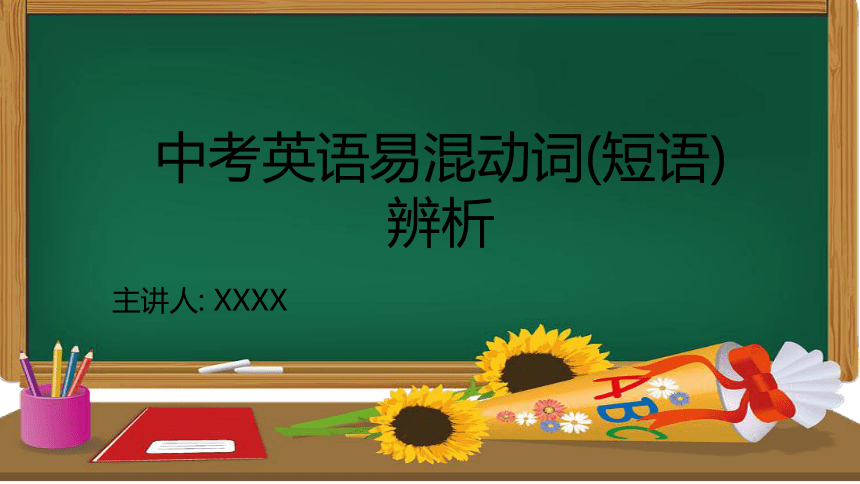
|
|
| 格式 | pptx | ||
| 文件大小 | 313.6KB | ||
| 资源类型 | 教案 | ||
| 版本资源 | 通用版 | ||
| 科目 | 英语 | ||
| 更新时间 | 2022-04-07 22:33:07 | ||
图片预览

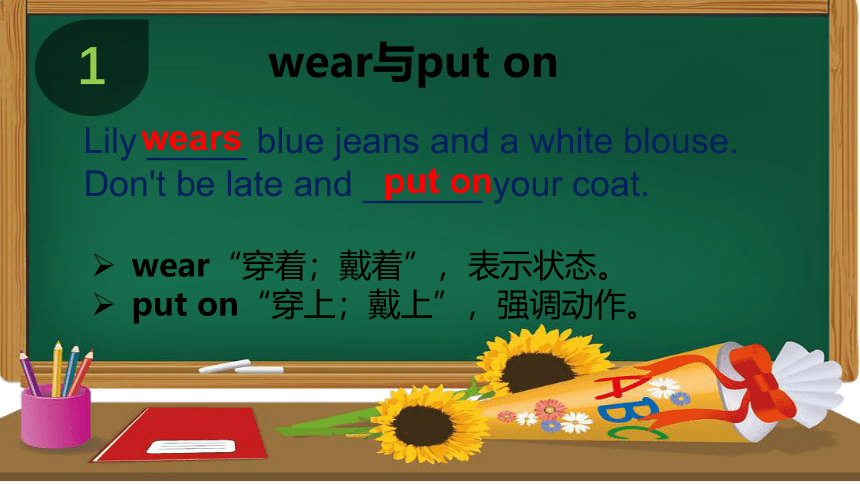
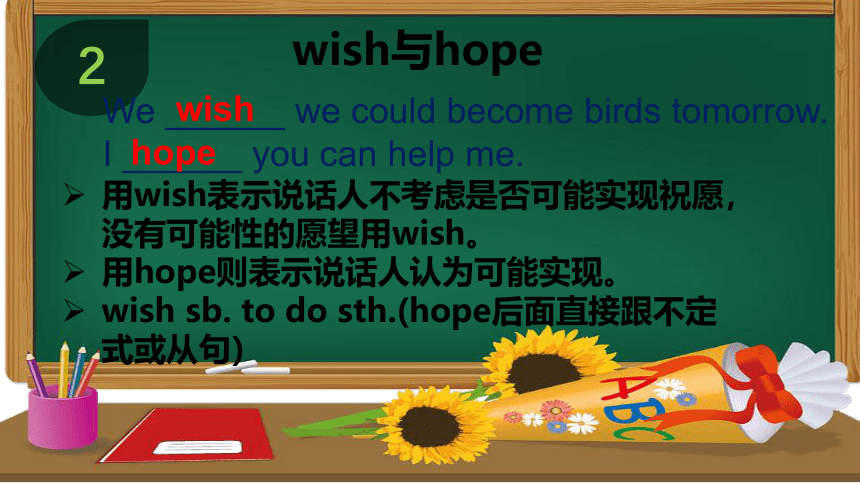
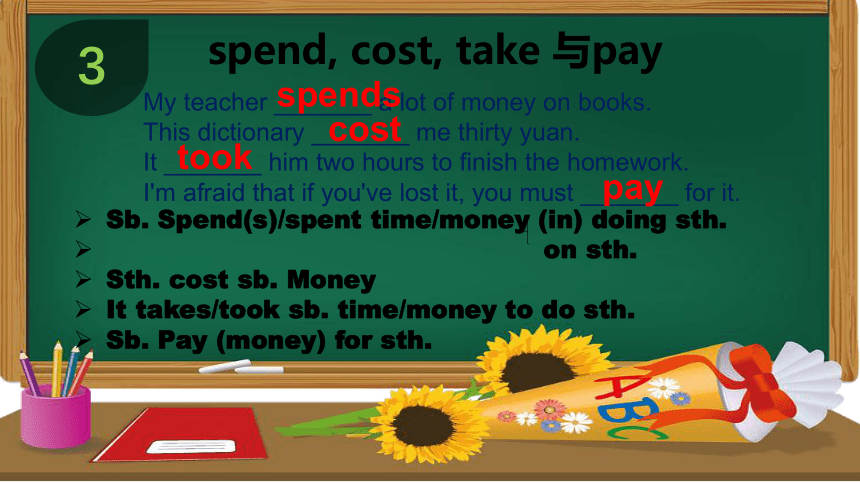
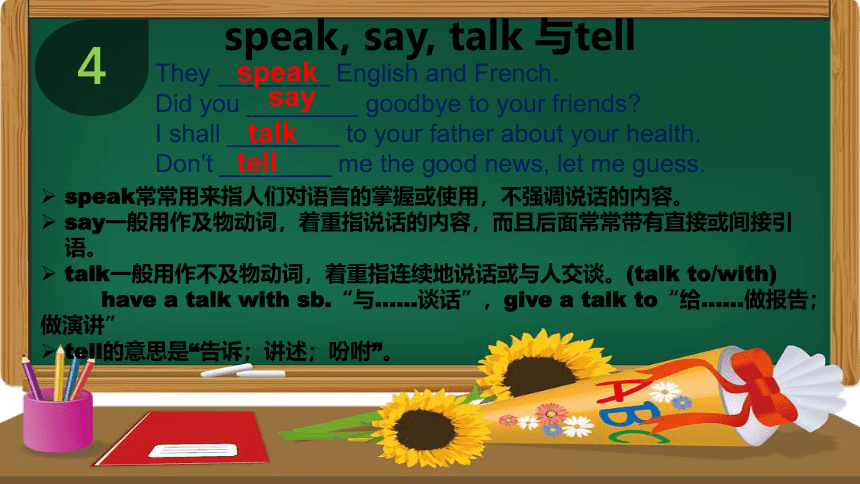

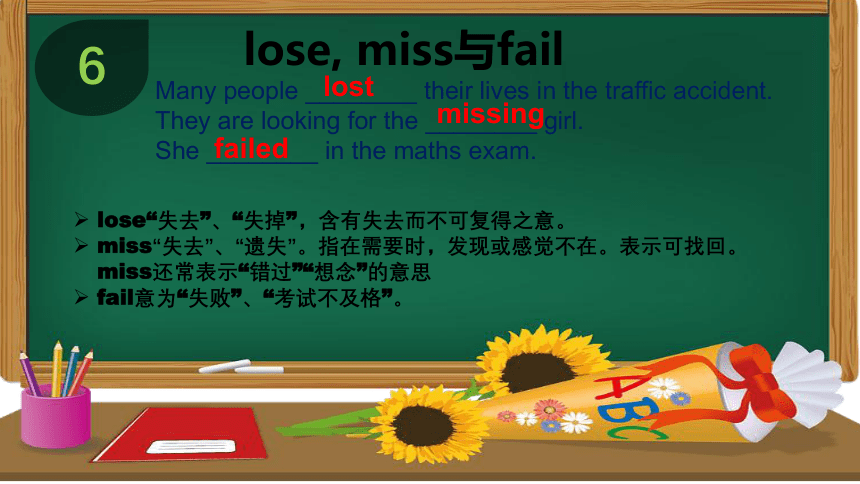
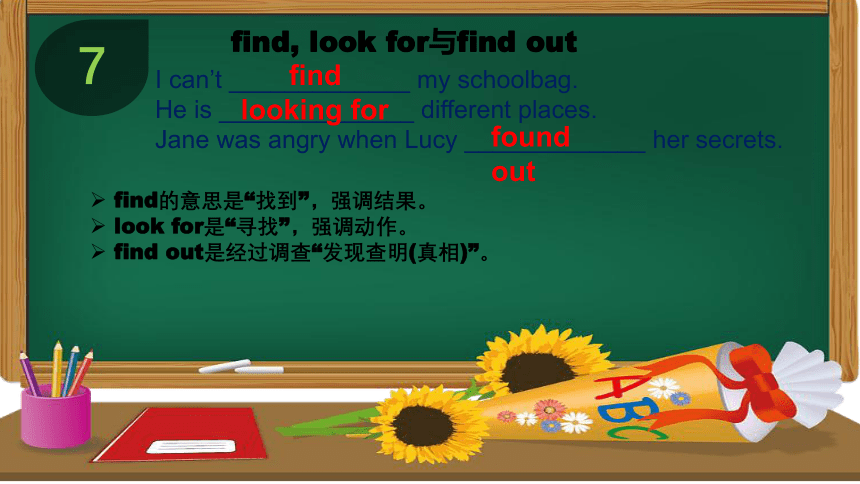
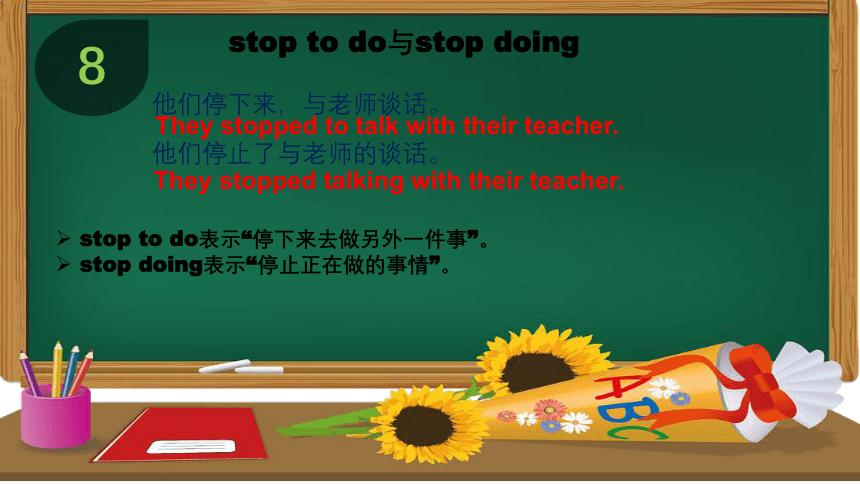
文档简介
(共21张PPT)
中考英语易混动词(短语)辨析
主讲人: XXXX
1
wear与put on
Lily _____ blue jeans and a white blouse.
Don't be late and ______ your coat.
wears
put on
wear“穿着;戴着”,表示状态。
put on“穿上;戴上”,强调动作。
2
wish与hope
We ______ we could become birds tomorrow.
I ______ you can help me.
wish
hope
用wish表示说话人不考虑是否可能实现祝愿,没有可能性的愿望用wish。
用hope则表示说话人认为可能实现。
wish sb. to do sth.(hope后面直接跟不定式或从句)
3
spend, cost, take 与pay
My teacher _______ a lot of money on books.
This dictionary _______ me thirty yuan.
It _______ him two hours to finish the homework.
I'm afraid that if you've lost it, you must _______ for it.
spends
cost
took
pay
Sb. Spend(s)/spent time/money (in) doing sth.
on sth.
Sth. cost sb. Money
It takes/took sb. time/money to do sth.
Sb. Pay (money) for sth.
4
speak, say, talk 与tell
They ________ English and French.
Did you ________ goodbye to your friends
I shall ________ to your father about your health.
Don't ________ me the good news, let me guess.
speak
say
talk
tell
speak常常用来指人们对语言的掌握或使用,不强调说话的内容。
say一般用作及物动词,着重指说话的内容,而且后面常常带有直接或间接引语。
talk一般用作不及物动词,着重指连续地说话或与人交谈。(talk to/with)
have a talk with sb.“与……谈话”,give a talk to“给……做报告;做演讲”
tell的意思是“告诉;讲述;吩咐”。
5
reach, arrive与get
We ________ the top of the hill at last.
They ________ in Beijing last week.
I ________ to school at about 7:30 every day.
reached
arrived
get
reach是及物动词,后面直接跟表示地点的名词作宾语。
arrive是不及物动词,后面要用介词at或in放在表示地点的名词之前(较大的城市或地区用in,较小的地方用at),如地点是副词(here、there、home等)时,不加介词。
get to一般多用于口语中,后面跟地点名词;如地点是副词(here、there、home等)时,不加介词。
6
lose, miss与fail
Many people ________ their lives in the traffic accident.
They are looking for the ________ girl.
She ________ in the maths exam.
lost
missing
failed
lose“失去”、“失掉”,含有失去而不可复得之意。
miss“失去”、“遗失”。指在需要时,发现或感觉不在。表示可找回。miss还常表示“错过”“想念”的意思
fail意为“失败”、“考试不及格”。
7
find, look for与find out
I can’t _____________ my schoolbag.
He is ______________ different places.
Jane was angry when Lucy _____________ her secrets.
find
looking for
found out
find的意思是“找到”,强调结果。
look for是“寻找”,强调动作。
find out是经过调查“发现查明(真相)”。
8
stop to do与stop doing
他们停下来,与老师谈话。
他们停止了与老师的谈话。
They stopped to talk with their teacher.
They stopped talking with their teacher.
stop to do表示“停下来去做另外一件事”。
stop doing表示“停止正在做的事情”。
9
look at, see与watch
______________ the picture.
It was dark in the room. We could ______________ nothing.
I'm going to ______________ the football game this evening.
Look at
see
watch
look at强调“看”的动作;
see“看见;看到”强调结果;
watch“观看”多指看动态的画面,如比赛或电视等。
10
lend, borrow 与keep
I _________ a book from Lily.
Don't _________ the bike to others.
You can _________ the book for two weeks.
borrowed
lend
keep
borrow“借进来”,向某人借某物用“borrow...from…”。
lend“借出去”,把某物借给某人,用lend…to…”。
borrow和lend都是短暂性动词,要表示借多久,要用keep。
11
leave, forget和lose
I _______ her address. Can you tell me
She is always careless. And she _______ her coat on the bus.
I've _______ the money.
forget
left
lost
三词都有“忘”、“丢”的意思。
forget一般表示“记不起”、“忘了要带(买)”;
leave表示“把某物忘(落)在某地了”;
lose表示“丢了,没找到(或找不到)”。
12
win与beat
They _______ the Giants by a score of 7 to 3.
Though it was not easy, they _______ the game at last.
beat
won
beat表示“打败”,后面跟的宾语是对手;
win表示“赢得”,后面跟比赛或活动等作宾语。
13
carry, take与bring
Please help me ________ it to the classroom.
May I ________ Tom to see you next Monday
The box is heavy. Can you ________ it
take
bring
carry
take是指将某物或某人从这里“带到”或“拿到”某处。
bring与take相反,是指将某物或某人从别处“带来”或“拿来”。
carry是指随身携带(背着、扛着、提着、抱着),不表明来去的方向。
fetch常指从说话地到另外一个地,取回某物。
14
cross和across
Is it safe to _______ the road now
Go _______ the bridge. You'll find the museum on the left.
cross
across
cross与across都表示“穿过;横过"的意思。
cross 是及物动词.
across是介词,across是前面必须还要有谓语动词。
15
hear与listen to
The little boy _______ someone knocking at the door.
Look! All the students are _______ the radio.
heard
listening to
动词hear与listen to之间的区别,同see与look at之间的区别非常相似。
hear的意思是“听见;听到”,强调结果;
listen to的意思是“倾听”(集中注意力去听),多强调动作。
16
hear of与hear from
I was very sad indeed to _____________ your father's death.
I haven’t _____________ him for a long time.
hear of
heard from
hear of 听说
hear from 收到……的来信
17
used to do sth. / be used to doing sth. / be used to do sth.
Jim __________ take a subway to work, but now he __________________ going to work by car.
This wood ____________________ make desks.
used to
is used to
is used to
used to do sth. 过去常常做某事
be used to doing sth. 习惯于做某事
be used to do…被用来做……(被动语态结构)
18
be made of / be made from / be made by / be made in
These wine bottles are _______________ glass.
This kind of wine is ______________ grapes.
This toy car is _________________ my father.
These clothes are _________________ Huzhou.
made of
made from
made by
made in
be made of“由……制成”,制成品看得出原材料。
be made from“由……制成”,制成品看不出原材料。
be made by“由……制造”,后面跟制造者。
be made in“在……制造”,in后面跟地点。
19
forget (remember) doing sth./ forget (remember) to do sth.
-The light in the office is still on.
-Oh, I forgot ________.
turning it off B. turn it off
C. to turn it off D. having turned it off
C
forget/remember to do 忘记/记得要去做某事。 (未做)
forget/remember doing 忘记/记得做过某事。 (已做)
Thank you!
中考英语易混动词(短语)辨析
主讲人: XXXX
1
wear与put on
Lily _____ blue jeans and a white blouse.
Don't be late and ______ your coat.
wears
put on
wear“穿着;戴着”,表示状态。
put on“穿上;戴上”,强调动作。
2
wish与hope
We ______ we could become birds tomorrow.
I ______ you can help me.
wish
hope
用wish表示说话人不考虑是否可能实现祝愿,没有可能性的愿望用wish。
用hope则表示说话人认为可能实现。
wish sb. to do sth.(hope后面直接跟不定式或从句)
3
spend, cost, take 与pay
My teacher _______ a lot of money on books.
This dictionary _______ me thirty yuan.
It _______ him two hours to finish the homework.
I'm afraid that if you've lost it, you must _______ for it.
spends
cost
took
pay
Sb. Spend(s)/spent time/money (in) doing sth.
on sth.
Sth. cost sb. Money
It takes/took sb. time/money to do sth.
Sb. Pay (money) for sth.
4
speak, say, talk 与tell
They ________ English and French.
Did you ________ goodbye to your friends
I shall ________ to your father about your health.
Don't ________ me the good news, let me guess.
speak
say
talk
tell
speak常常用来指人们对语言的掌握或使用,不强调说话的内容。
say一般用作及物动词,着重指说话的内容,而且后面常常带有直接或间接引语。
talk一般用作不及物动词,着重指连续地说话或与人交谈。(talk to/with)
have a talk with sb.“与……谈话”,give a talk to“给……做报告;做演讲”
tell的意思是“告诉;讲述;吩咐”。
5
reach, arrive与get
We ________ the top of the hill at last.
They ________ in Beijing last week.
I ________ to school at about 7:30 every day.
reached
arrived
get
reach是及物动词,后面直接跟表示地点的名词作宾语。
arrive是不及物动词,后面要用介词at或in放在表示地点的名词之前(较大的城市或地区用in,较小的地方用at),如地点是副词(here、there、home等)时,不加介词。
get to一般多用于口语中,后面跟地点名词;如地点是副词(here、there、home等)时,不加介词。
6
lose, miss与fail
Many people ________ their lives in the traffic accident.
They are looking for the ________ girl.
She ________ in the maths exam.
lost
missing
failed
lose“失去”、“失掉”,含有失去而不可复得之意。
miss“失去”、“遗失”。指在需要时,发现或感觉不在。表示可找回。miss还常表示“错过”“想念”的意思
fail意为“失败”、“考试不及格”。
7
find, look for与find out
I can’t _____________ my schoolbag.
He is ______________ different places.
Jane was angry when Lucy _____________ her secrets.
find
looking for
found out
find的意思是“找到”,强调结果。
look for是“寻找”,强调动作。
find out是经过调查“发现查明(真相)”。
8
stop to do与stop doing
他们停下来,与老师谈话。
他们停止了与老师的谈话。
They stopped to talk with their teacher.
They stopped talking with their teacher.
stop to do表示“停下来去做另外一件事”。
stop doing表示“停止正在做的事情”。
9
look at, see与watch
______________ the picture.
It was dark in the room. We could ______________ nothing.
I'm going to ______________ the football game this evening.
Look at
see
watch
look at强调“看”的动作;
see“看见;看到”强调结果;
watch“观看”多指看动态的画面,如比赛或电视等。
10
lend, borrow 与keep
I _________ a book from Lily.
Don't _________ the bike to others.
You can _________ the book for two weeks.
borrowed
lend
keep
borrow“借进来”,向某人借某物用“borrow...from…”。
lend“借出去”,把某物借给某人,用lend…to…”。
borrow和lend都是短暂性动词,要表示借多久,要用keep。
11
leave, forget和lose
I _______ her address. Can you tell me
She is always careless. And she _______ her coat on the bus.
I've _______ the money.
forget
left
lost
三词都有“忘”、“丢”的意思。
forget一般表示“记不起”、“忘了要带(买)”;
leave表示“把某物忘(落)在某地了”;
lose表示“丢了,没找到(或找不到)”。
12
win与beat
They _______ the Giants by a score of 7 to 3.
Though it was not easy, they _______ the game at last.
beat
won
beat表示“打败”,后面跟的宾语是对手;
win表示“赢得”,后面跟比赛或活动等作宾语。
13
carry, take与bring
Please help me ________ it to the classroom.
May I ________ Tom to see you next Monday
The box is heavy. Can you ________ it
take
bring
carry
take是指将某物或某人从这里“带到”或“拿到”某处。
bring与take相反,是指将某物或某人从别处“带来”或“拿来”。
carry是指随身携带(背着、扛着、提着、抱着),不表明来去的方向。
fetch常指从说话地到另外一个地,取回某物。
14
cross和across
Is it safe to _______ the road now
Go _______ the bridge. You'll find the museum on the left.
cross
across
cross与across都表示“穿过;横过"的意思。
cross 是及物动词.
across是介词,across是前面必须还要有谓语动词。
15
hear与listen to
The little boy _______ someone knocking at the door.
Look! All the students are _______ the radio.
heard
listening to
动词hear与listen to之间的区别,同see与look at之间的区别非常相似。
hear的意思是“听见;听到”,强调结果;
listen to的意思是“倾听”(集中注意力去听),多强调动作。
16
hear of与hear from
I was very sad indeed to _____________ your father's death.
I haven’t _____________ him for a long time.
hear of
heard from
hear of 听说
hear from 收到……的来信
17
used to do sth. / be used to doing sth. / be used to do sth.
Jim __________ take a subway to work, but now he __________________ going to work by car.
This wood ____________________ make desks.
used to
is used to
is used to
used to do sth. 过去常常做某事
be used to doing sth. 习惯于做某事
be used to do…被用来做……(被动语态结构)
18
be made of / be made from / be made by / be made in
These wine bottles are _______________ glass.
This kind of wine is ______________ grapes.
This toy car is _________________ my father.
These clothes are _________________ Huzhou.
made of
made from
made by
made in
be made of“由……制成”,制成品看得出原材料。
be made from“由……制成”,制成品看不出原材料。
be made by“由……制造”,后面跟制造者。
be made in“在……制造”,in后面跟地点。
19
forget (remember) doing sth./ forget (remember) to do sth.
-The light in the office is still on.
-Oh, I forgot ________.
turning it off B. turn it off
C. to turn it off D. having turned it off
C
forget/remember to do 忘记/记得要去做某事。 (未做)
forget/remember doing 忘记/记得做过某事。 (已做)
Thank you!
同课章节目录
- 词法
- 名词
- 动词和动词短语
- 动词语态
- 动词时态
- 助动词和情态动词
- 非谓语动词
- 冠词
- 代词
- 数词和量词
- 形容词副词及其比较等级
- 介词和介词短语
- 连词和感叹词
- 构词法
- 相似、相近词比较
- 句法
- 陈述句
- 一般疑问句和否定疑问句
- 特殊疑问句及选择疑问句
- 反意疑问句
- 存在句(There be句型)
- 宾语从句
- 定语从句
- 状语从句
- 主谓一致问题
- 简单句
- 并列句
- 复合句
- 主谓一致
- 主、表语从句
- 名词性从句
- 直接引语和间接引语
- 虚拟语气
- 感叹句
- 强调句
- 倒装句
- 祈使句
- 句子的成分
- 句子的分类
- 题型专区
- 单项选择部分
- 易错题
- 完形填空
- 阅读理解
- 词汇练习
- 听说训练
- 句型转换
- 补全对话
- 短文改错
- 翻译
- 书面表达
- 任务型阅读
- 语法填空
- 其他资料
